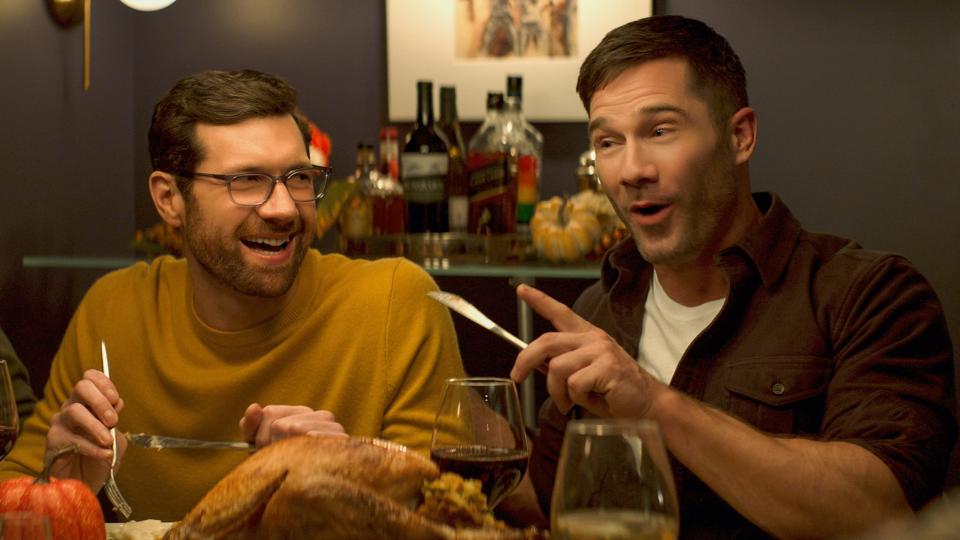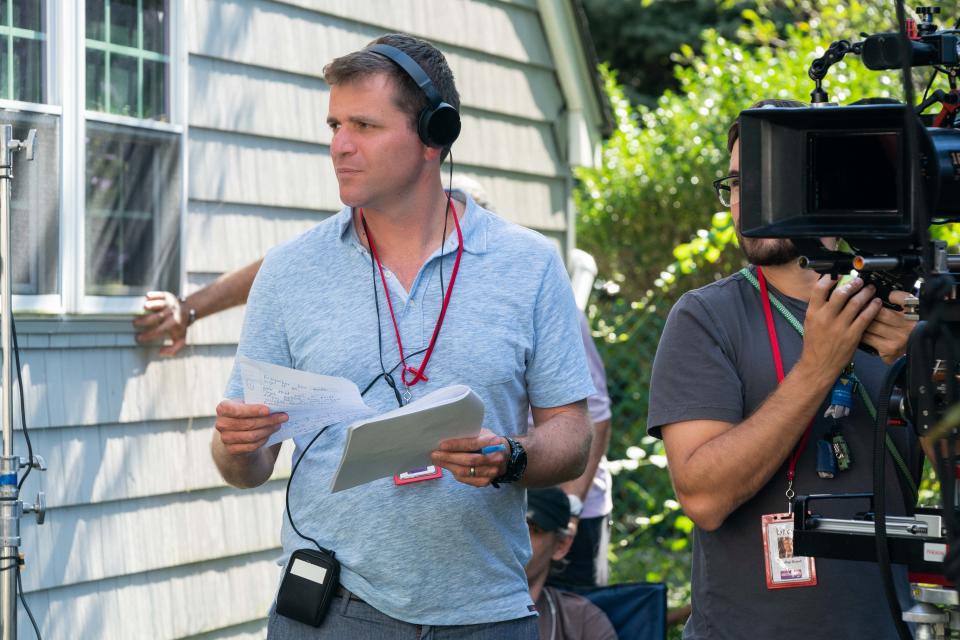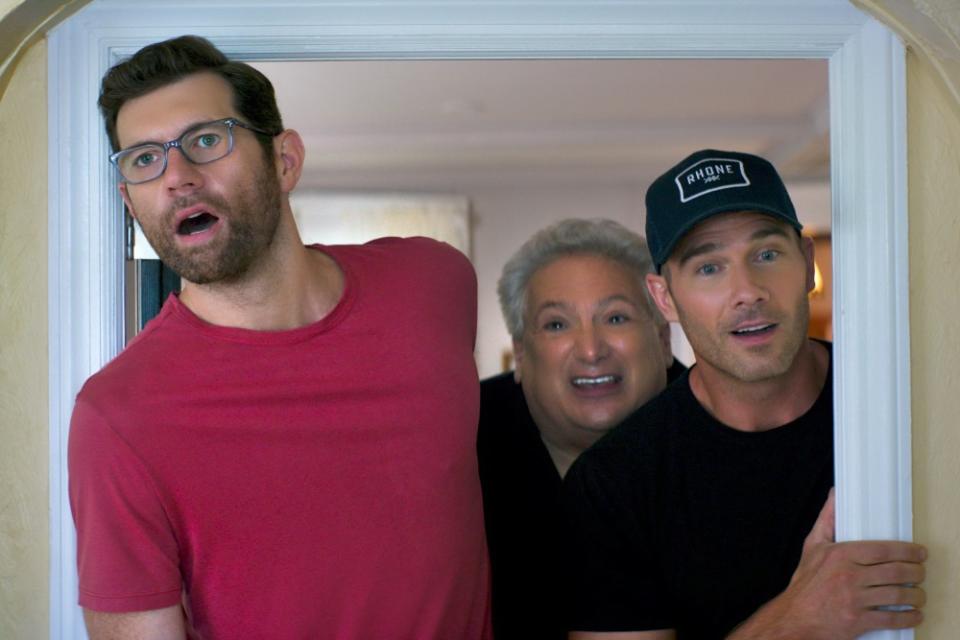Here’s Why Straight People Should Go See ‘Bros’ in Theaters

Nick Stoller and Billy Eichner’s “Bros” has plenty going for it beyond its allegedly boundary-breaking elements — Eichner, who co-wrote the film and stars in it, called it “the first gay rom-com ever released by a major studio” earlier this year, which is kind of true, but also not at all essential for enjoying the film on its own merits — and should (hopefully) prove to be box office catnip for audiences starved for funny, sexy, sweet romantic comedies.
“Bros” stars an entirely LGTBQ+ cast (even straight characters are played by LGBTQ+ stars, a funny twist on Hollywood’s predilection for often keeping gay stars in the closet by casting them as straight characters) and centers on Eichner as a jaded podcast host who falls for Hallmark Channel alum Luke Macfarlane; the cast also includes Harvey Fierstein, Bowen Yang, Symone, Miss Lawrence, Guy Branum, Guillermo Diaz, Amanda Bearse, and Ts Madison.
More from IndieWire
As Eichner’s Bobby Lieber jokes throughout the film — it’s even part and parcel of its latest trailer — finding a way to tell gay stories for straight audiences is confusing at best, meaningless at worst. “Love is love is love”? That’s bullshit, and even as “Bros” tries to skewer the point, it’s still wrapped in a very traditional genre framework. Is this gay romance really engineered to appeal mostly to straight audiences? Well, maybe, and perhaps that’s indicative of its sneaky radical power.
IndieWire executive editor Kate Erbland, deputy managing editor Ryan Lattanzio, and associate editor Jude Dry have all seen — and enjoyed! — the film, and are eager to hash it out: who is “Bros” for? And what does that mean for this, yes, boundary-breaking studio feature?
KATE ERBLAND: So many of the early marketing materials for “Bros” have played up its more meta elements, as Eichner’s world-weary, delightfully dark podcast host/museum curator Bobby Lieber (he’s on that grind!) gabs about his experiences being asked to write a rom-com…about gay guys…that will appeal to straight audiences. Movie-within-a-movie, ahoy!
But not quite: “Bros” isn’t actually about Bobby writing a rom-com with wide-ranging appeal that just so happens to be about gay dudes, even if that’s exactly what Eichner is doing with “Bros.” Bobby might be outwardly resistant to whipping up a movie for all audiences, but as he starts to fall in love with the charming Aaron (Macfarlane), he can’t seem to escape the rom-com beats ruling his own life.

Universal
It’s all quite tongue-in-cheek, very funny, and highly aware of its place within the rigid genre framework of the studio-backed rom-com. Still, Eichner and Stoller are eager to pack this relatively predictable romance with realistic elements that might not necessarily feel familiar to very straight audiences: the grind of finding someone on Grindr, the shifting perimeters of what monogamy looks like, and plenty of orgies to boot. Yes, I think it’s a film that’s designed for straight people, but with a sneakily wide-ranging mindset. In using the constraints of the genre, “Bros” often busts right out of them.
Ryan, the film is (unsurprisingly) keen to prove that, while it might often look and feel like any other rom-com, it’s got some serious LGBTQ+ backing to it. What were some of your favorite parts in which Eichner and company let the film wave its rainbow flag high and proud?
RYAN LATTANZIO: Certainly my favorite aspect of “Bros” is that it’s the first studio LGBTQ movie maybe ever that doesn’t take on pain or suffering or trauma or systemic homophobia. Yes, writer/star Billy Eichner and director Nicholas Stoller’s raunchy meet-cute for the Grindr age (or more cheekily dubbed “Zellweger” here; hilarious) is mostly a gay movie wrapped up in a straight package (that package being the rom-com format established in old Hollywood and mastered by Nora Ephron in the ‘90s).
But the actual breaking of ground here — beyond the cast being top-to-toe gay, gay, gay — is in how “Bros” conforms to that very formula. The project, if you will, of being queer is about dismantling established cultural myths and remaking them as our own: “Bros” does exactly that.
I also love how unapologetic Bobby (Eichner) is: He interrogates queer culture in his podcast and is suspicious of the very stereotypes he knows he inhabits. (Early in the movie, he wins an award for “Cis White Gay Man of the Year.”) “Bros” is honest and open about how most single gay men feel lonely, cynical, and alienated not just by the straight world, but by their own community.

Universal
There’s a hilarious running gag about the “Hey what’s up?” back-and-forth that in reality dominates so many Grindr exchanges ahead of a sure-to-be disappointing meet-up. Though, in the end, “Bros” is largely a Judd Apatow-produced studio comedy (and has the unnecessary running time to match that director’s own R-rated laughfests), and so there is only so much in-your-face button-pushing it can do. I do wish the movie had done more to unpack the particulars and messiness of guy-on-guy sex, but it’s certainly bold in showing how the definitions of coupled-up sexdom continue to expand in our arena.
Jude, did you feel like “Bros” pushed it far enough in terms of delivering an eye-opening movie about the gay experience to the mainstream audience the filmmakers hope to attract? I still worry if the opening-weekend audience here will be limited to gay men, but it’s up to us to spread the word. Or not.
JUDE DRY: That’s the challenge Eichner, Stoller, and Apatow seem to have set for themselves, Ryan. Though I can’t help but worry they’re playing the wrong game. Although I suppose any gay rom-com set in the Apatow-verse was always going to feel aimed at straight audiences: That’s Apatow’s bread and butter. “Bros” is trying to do for gay dudes what “Trainwreck” and Amy Schumer did for women. I say “gay dudes” for a reason, because that’s who it feels like this movie is for. Aaron is the kind of gay guy the respectability politics crowd wanted to parade around in the ’90s. Is it eye-opening to show that hunky, Garth Brooks-loving, former hockey players can be gay too? He’s a sweet character, but this strikes me as a very transparent play at palatable gayness.
Of course, Bobby flies in the face of all of that. He’s loud, opinionated, neurotic, and fiercely passionate about LGBTQ+ rights and history. He challenges Aaron on his heteronormative tendencies, and isn’t afraid to upset mom at dinner. Eichner is smart, and he made his name on combative street humor. He’s already played out all of the arguments against this movie in his head, and he’s beat us to the punch by making fun of us first. The whole LGBTQ+ museum plot seems manufactured to include every possible identity, from bisexual men to angry lesbians to multiple trans/gender non-conforming women (thank you Ts Madison, Eve Lindley, and Miss Lawrence). Their constant bickering over proper representation for their piece of the rainbow pie isn’t just for laughs — it’s Eichner’s answer to the movie’s inevitable critics.
But stating it out loud doesn’t change the fact that the central romance is still between two white cis gay men. Does Eichner get a pass simply for making fun of this fact? While Aaron is a sweet character, he seems almost genetically engineered to be the least offensive, most All-American version of a hunky gay dude. He is the epitome of “masc4masc”; of the kind of apolitical gay man who walks around completely unbothered by his otherness until someone assumes his boyfriend is his brother. Compared to this Adonis, Bobby becomes the underdog because he’s what — too skinny?
As a fan of “Trainwreck,” Kate, how do you see “Bros” fitting into the Apatow-verse? And do you think they’re playing the right game?
ERBLAND: I think you’re right on the money, Jude, “Bros” will do for gay dudes what “Trainwreck” and Amy Schumer did for women. And while you sagely point out that it’s gay dudes at the heart of this push toward more inclusive (read: more honest) studio-backed filmmaking, I can’t help but think that, as something like “40-Year-Old Virgin” (dude humor, fun, but still dude-centric) helped make “Trainwreck” (women! being funny? what a world!) feel possible, and “Trainwreck” might have made “Bros” possible, perhaps “Bros” will make something else possible, like an Apatowian lesbian rom-com.

Nicole Rivelli/Universal Pictures
Change is slow, especially in Hollywood, and while I imagine that scads of studio bigwigs were absolutely salivating for my initial reaction to the film’s more LGBTQ-honed humor — I leaned over to Ryan a handful of times to ask, “Is that what it’s like?” — that’s a win in my book. It’s, at the very least, a step forward.
Ryan, is “Bros” going to do something wild, like, oh, change some minds and hearts?
LATTANZIO: Billy Eichner has stressed on the press trail for “Bros” that here is a movie about real gay men with real gay issues like commitment-phobia, body insecurity, self-loathing — in other words, the darker side of gay male life in the 21st century. I think that’s a fair assessment but, to a degree, the movie does want to have it both ways with regard to what Jude suggested: Bobby and Aaron make for a palatable, easy-on-the-eyes-and-minds gay couple for the multiplex. “Bros” is hardly the warts-and-all portrait it may aspire to be, but I also am not quite so sure the world is ready to embrace that.
How far “Bros” does move the needle depends on how much people are willing to vote with the dollars on opening weekend. But it is a start; in the same way that “Trainwreck” opened the doors for “messy” comedies about women (even though they were there all along in the indie space), “Bros” could herald opportunities for more top-billed gay representation over the generally sidelined supporting hangers-on it feels like we’ve historically played in bigger-budget comedies.
Eichner has been careful to say that this is not an “indie” or “some streaming thing which feels disposable.” That may be true. “Bros” isn’t disposable. But I’m not sure how much of an all-timer it really is, however a delightful reality-rooted fantasy it may be.

Universal Pictures
Jude, do you feel like “Bros” achieves anything change-effecting here in the broader spectrum of queer cinematic storytelling?
DRY: In terms of storytelling, it’s a very funny comedy that happens to be about the particular indignities (and pleasures) of contemporary gay life. It’s not radical, but recent attempts have shown it’s very hard to pull off, and Eichner did. What is very radical about “Bros” is the all-queer cast, which extended to below the line roles wherever possible (shout-out to my friends production designer Lisa Myers and set decorator Nicki Ritchie). That’s something audiences won’t necessarily see that will actually have the most impact in Hollywood. “Bros” put studio money in queer people’s pockets and major credits on their resumes.
By making sure everyone in the cast was queer, Eichner used the factors he could control to make a political statement. After making peace with his status as a Hallmark hunk, Luke Macfarlane finally got to prove his leading man charisma. And I was delighted to learn Aaron’s conservative mom, for instance, is ” Married… with Children” star Amanda Bearse, the first primetime actress to come out as a lesbian (on the cover of The Advocate in 1993)! Or to see original “Queer Eye” cast member Jai Rodriguez mugging it up as Aaron’s straight brother. Not to mention Harvey Fierstein, Guy Branum, Guillermo Diaz, Jim Rash, Monica Raymund, and Peter Kim in supporting roles. The credits play like a who’s who of gay entertainers from the last fifty years.
Eichner put his (and Universal’s) money where his mouth is, and “Bros” should lead to more work for everyone involved. The impact of those credits will be felt for a very long time. Hopefully Hollywood is paying attention.
A Universal Pictures release, “Bros” is now in theaters.
Best of IndieWire
Where to Watch This Week's New Movies, from 'The Starling Girl' to 'BlackBerry'
Every Palme d'Or Winner from the Cannes Film Festival, Ranked
Sign up for Indiewire's Newsletter. For the latest news, follow us on Facebook, Twitter, and Instagram.

